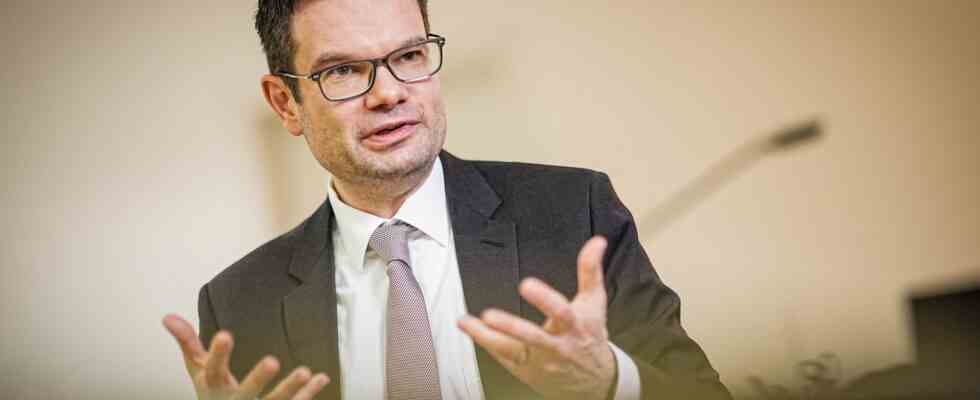Status: 10.11.2022 6:40 p.m
Federal Minister of Justice Buschmann has had to take a lot of criticism from his country colleagues. It’s about the money again. When it came to data retention, things went better for the FDP minister.
“The relationship needs a lot of improvement.” Georg Eisenreich, Bavarian Minister of Justice (CSU) and Chairman of the Conference of Ministers of Justice of the federal states, is annoyed. Reason for his displeasure: Marco Buschmann (FDP). According to Eisenreich, he has already met three federal justice ministers, but working together with “the others” was better. “Much better,” he adds.
Anna Gallina (Greens) and Marion Gentges (CDU), his colleagues from Hamburg and Baden-Württemberg, also speak of a “clear dissent” and a lack of openness in communication.
The justice ministers of the federal states feel they have been let down by the federal government – and made that clear today at their autumn conference in Berlin. It’s about money and a crucial sentence in the 2021 traffic light coalition agreement. It says: “We are consolidating the pact for the rule of law with the federal states and expanding it with a digital pact for the judiciary.” According to the countries, this was a clear promise for more money. But that is exactly what is in question.
Funding for jobs in the judiciary
The pact for the rule of law was actually a project of the past legislature, pushed under Katharina Barley (SPD). There was a total of 220 million euros from the federal government: start-up funding for 2000 new jobs in the judiciary. The federal states expect this funding to continue – and additional finance for the digitization of the judiciary: 350 million euros – per year. This is also how the judges’ association sees it: “The traffic light coalition must keep both promises of the coalition agreement and, in addition to a digital pact with the federal states, also initiate multi-year co-financing of new jobs by the federal government.”
The main argument: the effect of the first pact fizzled out long ago, the relief eaten up by new tasks, additional procedures, work intensification also triggered by new guidelines and new federal laws. Therefore – even if the judiciary is largely a matter for the federal states – more money is needed.
Buschmann wants to give a maximum of 200 million
The Federal Minister of Justice also wants to give something, just not nearly as much as the states are demanding. He promises a maximum of 200 million euros by 2026 – but earmarked. Not for new judges or judicial employees, but for digitization projects, some of which the federal government wants to set up itself. Buschmann speaks of a “pact for the digital constitutional state”. The state ministers of “deceptive packaging” and “false labeling”.
In conversation with the ARD Capital Studio the Federal Minister of Justice refers to the responsibility of the federal states and also to the fact that the financial resources of the federal government have now “changed dramatically” as a result of the crisis. Means: More money is probably not in it and the sentence from the coalition agreement is at least partially obsolete.
The 200 million euros proposed by Buschmann are gladly taken “as a down payment,” counters Georg Eisenreich. At the moment, there is only agreement that the talks will be intensified and that a joint digital summit will be held in the spring – in order to draw clearer goals and strategies for the digitization of the judiciary. When it comes to money, the state ministers now want to put pressure on the prime ministers.
Tailwind on “Quick Freeze”
At least Buschmann gets some tailwind from the countries on another topic: In the discussion about the successor for the tipped data retention. Nine of the 16 ministers sided with the FDP politician for the so-called “quick freeze procedure”.
It works like this: If there is a concrete suspicion of a serious crime, a judge could ask a telecommunications company to freeze all existing data on a suspect and his contacts. If the suspicion is confirmed, the data can be thawed – i.e. handed over to the investigators. As with freezing, thawing would have to be ordered by a judge.
In the traffic light, the conflict will probably continue
For Bavaria’s Justice Minister Eisenreich, that’s not enough. He pleads for a general storage of IP addresses. Because if the provider doesn’t save anything, you can’t freeze anything. Eisenreich therefore calls “quick freeze” “window dressing”. The chairman of the conference of justice ministers is thus clearly standing by the side of Federal Interior Minister Nancy Faeser (SPD).
The is committed to securing the IP addresses in future when investigating on the Internet. Faeser sees himself confirmed by a ruling by the European Court of Justice in September. The judges believe that “light data retention” is possible under certain conditions. Since neither the Ministry of Justice nor the Ministry of the Interior are currently willing to compromise, the topic will probably soon be raised in a coalition committee. Buschmann is regularly involved in the top lap of the traffic lights, but not Faeser.
At least the conference of justice ministers has positioned itself – for Buschmann and “Quick Freeze”. However, not even the justice ministers themselves believe that this plays a major role in the traffic light internal dispute.


